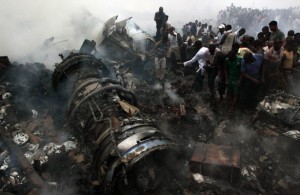By Tayo Olaleye
I had the mind to write something else this time but one cannot ignore the disaster that happened on the 3rd of June 2012 when over a hundred people lost their lives following the crash of a DanaAir plane. Not to point blaming fingers at anyone but a lot of things can be learnt from this tragedy. It has happened before and we have to ensure that it does not happen again as well as have a full-proof emergency plan. This tragedy reminded me of the tragedy of September 11 (9/11) in New York back in 2001. Besides it being a terrorist attack, the tragedy in both Iju, Lagos and the 9/11 in New York were similar in some ways. Both involved at least a plane crashing into buildings with innocent people and the death of a lot of people. However, the striking difference was the emergency and rescue efforts that occurred after the 9/11 attacks some of which are highlighted below.
- Shortly after the 9/11 attack, the whole area near and around the site was cordoned off. With the exception of relief volunteers and experts, no-one was allowed near the site.
- Medical staff and fire service: This in itself is self explanatory. These were one of the first people on site following 9/11. This included doctors, nurses, volunteers etc.
- Police: Their presence was crucial to evacuate people from the site and maintain relative calm.
- A select few of the community also took turns to provide water and food as necessary.
Following the emergency and rescue efforts, came recovery. These included a huge chunk of the community to help clean the debris, engineers, electricians, plumbers, people to collect metals etc. In all of this, it is evident that ORGANISATION is key. There was a plan even before it happened. This was why things moved so fast.
Now, I know it is a long stretch to compare the U.S to Nigeria but there are things that we need to get better at, things we need to do in an event of a disaster. Let us also remember that this goes beyond air related disasters but also includes road accidents too. Take for example, the multiple car crash involving over 20 cars that happened a couple of days ago in Sagamu. Thankfully, no one died from that horrible scenario but it could have easily been a different story. To bring it more into perspective, the fiasco between the Lagos government and doctors is still on. If that car crash had been worse, the amount of casualties will definitely have increased. Rescue and emergency should bring together the police, health officials, telecoms, the local and the state government. In contrast to 9/11, there were a significantly high number of people at the crash site in Iju. This in itself is unsafe. If, for example, a second explosion went off, the number of casualties would have increased. Also, there was little running water which in itself was a deterrent to the already stretched fire service.
In the event that calamities happen, there should already be an emergency team set up. This team should comprise of volunteers, medical personnel, police, journalists from key media groups, hospitals, contact details of mortuaries etc. This team should be well organised and work very fast. There should also be emergency phone numbers for people to easily contact when in an emergency and campaigns held to educate the populace on how to respond to an emergency. The people in the Iju area, particularly those whose houses were damaged should also be catered to – water, food, bednets etc. This proposed emergency team should not be limited to the ‘government’ but also privately owned establishment and work places. What is the emergency procedure at your work place?
We cannot keep dying like this. This is our country! What happened on 3/06/2012 could have happened to any one of us! Let us be our brothers keepers. May the souls of the departed rest in peace.
We must lobby the leadership of the health and emergency system to ensure that we rapidly move forward so that the next time a tragedy like this happens, the system is prepared.
